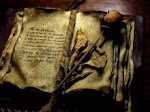
Julius von Klever (Russian painter) 1850 - 1924
Лесной царь (Der Erlkönig), 1887
oil on canvas
155 x 211 cm. (61.02 x 83.07 in.)
private collection.
"Erlkönig" is a poem by Johann Wolfgang von Goethe. It depicts the death of a child assailed by a supernatural being, the Erlking or "Erlkönig". It was originally composed by Goethe as part of a 1782 Singspiel entitled Die Fischerin.
The poem has been set to music by several composers, most notably by Franz Schubert.
An anxious young boy is being carried home at night by his father on horseback. To what sort of home is not spelled out; German Hof has a rather broad meaning of "yard," "courtyard," "farm," or (royal) "court." The lack of specificity of the father's social position allows the reader to imagine the details.
As the poem unfolds, the son seems to see and hear beings his father does not; the reader cannot know if the father is indeed aware of their presence, but he chooses to comfort his son, asserting reassuringly naturalistic explanations for what the child sees – a wisp of fog, rustling leaves, shimmering willows. Finally, the child shrieks that he has been attacked. The father rides faster to the Hof. There, he recognizes that the boy is dead.
The Erl-King - Johann Wolfgang von Goethe
Who rides there so late through the night dark and drear?
The father it is, with his infant so dear;
He holdeth the boy tightly clasp'd in his arm,
He holdeth him safely, he keepeth him warm.
"My son, wherefore seek'st thou thy face thus to hide?"
"Look, father, the Erl-King is close by our side!
Dost see not the Erl-King, with crown and with train?"
"My son, 'tis the mist rising over the plain."
"Oh, come, thou dear infant! oh come thou with me!
For many a game I will play there with thee;
On my strand, lovely flowers their blossoms unfold,
My mother shall grace thee with garments of gold."
"My father, my father, and dost thou not hear
The words that the Erl-King now breathes in mine ear?"
"Be calm, dearest child, 'tis thy fancy deceives;
'Tis the sad wind that sighs through the withering leaves."
"Wilt go, then, dear infant, wilt go with me there?
My daughters shall tend thee with sisterly care;
My daughters by night their glad festival keep,
They'll dance thee, and rock thee, and sing thee to sleep."
"My father, my father, and dost thou not see,
How the Erl-King his daughters has brought here for me?"
"My darling, my darling, I see it aright,
'Tis the aged grey willows deceiving thy sight."
"I love thee, I'm charm'd by thy beauty, dear boy!
And if thou'rt unwilling, then force I'll employ."
"My father, my father, he seizes me fast,
For sorely the Erl-King has hurt me at last."
The father now gallops, with terror half wild,
He grasps in his arms the poor shuddering child;
He reaches his courtyard with toil and with dread, –
The child in his arms finds he motionless, dead.






















No hay comentarios:
Publicar un comentario